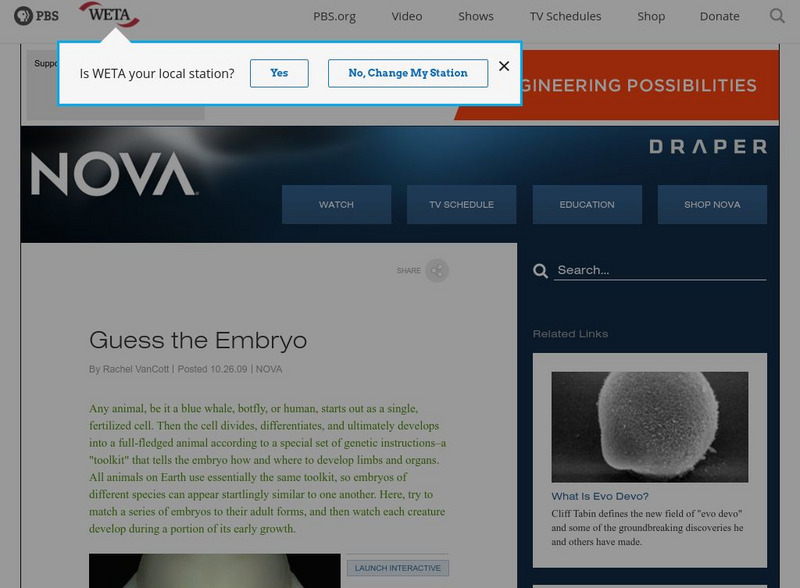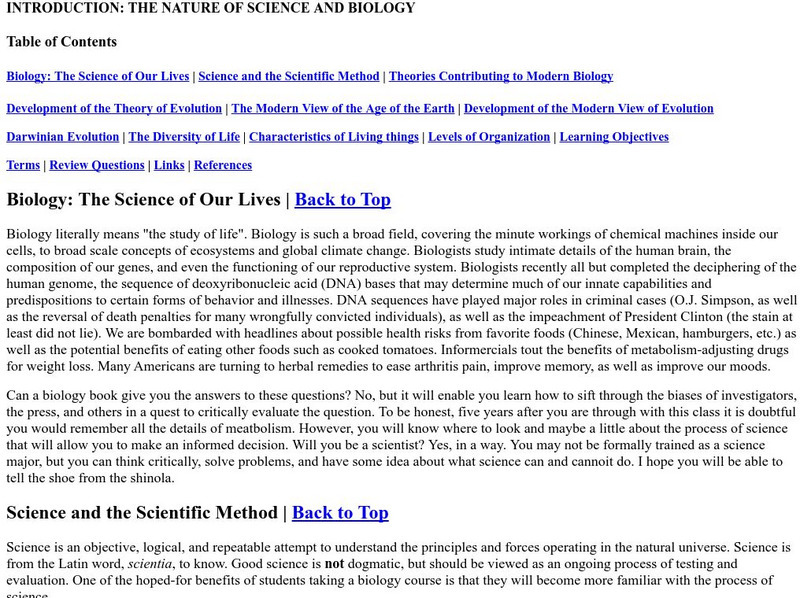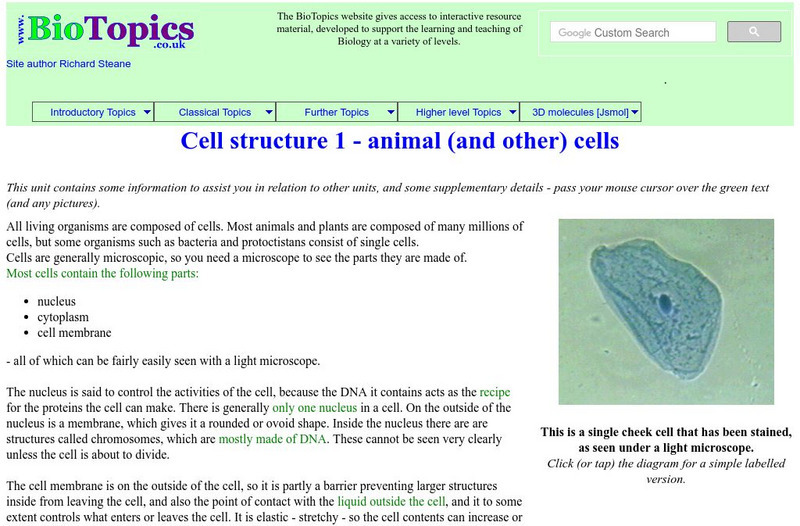Cells Alive
Cells Alive!: How Big Is A
"Use this animation to compare the relative sizes of cells and organisms sitting on a pinhead. See the size of these nearly invisible without magnification" View dust mites dwarf pollen grains and human cells. In turn, bacteria and...
BBC
Bbc: Gcse Bitesize: Animal Organization Digestion Aqa
This lesson focuses on the structures of carbohydrates, proteins, and lipids including defining terms, a brief discussion of what they do, and diagrams of each. It also provides a link to a test.
PBS
Pbs Nova: Guess the Embryo
Every animal starts out as a single, fertilized cell. What happens then? Launch an interactive that showcases four similar-looking embryos. Can you guess what each one of them actually is? Watch them develop.
Estrella Mountain Community College
Online Biology Book: The Nature of Science and Biology
Use the scientific reasoning and critical thinking to take an in-depth look at the basics of biology.
Exploratorium
Exploratorium: Microscope Imaging Station: Cell Motility
This interesting site explains how cells move and provides videos depicting the movement of various human and animal cells.
BiologyWise
Biology Wise: Functions of a Centrosome and Its Role in Cell Division
Discusses the discovery of centrosomes, their important role in mitosis in animal cells, and their other functions.
TeachEngineering
Teach Engineering: Cell Membrane Structure and Function
Students learn about the different structures that comprise cell membranes, fulfilling part of the Research and Revise stages of the legacy cycle. Students view online animations of cell membrane dynamics (links provided). Then they...
Cold Spring Harbor Laboratory
Dna From the Beginning: Higher Cells Have Ancient Dna
Eukaryotic cells have separate DNA from mitochondria and chloroplasts which indicates that they were once primitive cells on their own. This multimedia article includes animations, pictures, video, biographical information, and quiz...
Cold Spring Harbor Laboratory
Dna From the Beginning: Different Cells Different Genes
Many scientists have worked on discovering what genes are "turned on" within cells at different stages of development. DNA arrays and gene chips are techniques that have been developed. This article will help you understand these...
Cold Spring Harbor Laboratory
Dna From the Beginning: Dna Responds to Signals
Genes are turned on and off in many ways. This article covers chemical signal transduction. Article includes animations, pictures, video, biographical information, and quiz questions that are accessed by clicking on buttons along the...
National Health Museum
Access Excellence: Cells on a Ceiling
In this lesson plan site, each student is assigned a cell part to research, create, and place inside of a clear plastic drop cloth (the cell) the size of one-half of the classroom ceiling.
Bio Topics
Bio Topics: Cell Structure
A reference site exploring cell structure. Learn about the structures and functions of the major organelles of the cell. Also included are research questions to better understand the cell.
My Science Site
My Science Site: Cell Center Activities [Pdf]
Site provides six possible center activities for teachers to use to engage students in the study of cells.
That Quiz
That Quiz: Practice Test: Biology Cells
Take this practice quiz to test your knowledge of cells. See how fast you can name the parts of the six different cells. By changing the level, it is appropriate for students of all grades.
CK-12 Foundation
Ck 12: Life Science: 2.8 Plant Cell Structure
Explore the difference between animal and plant cells.
PBS
Pbs Teachers: Vanished: Inside the Jet Stream: Giving Rise to the Jet Stream
Explore what generates a jet stream, and discover why they flow from west to east. A link is offered in this site to a helpful animation describing the jet stream process.
BiologyWise
Biology Wise: The Cell Wall Functions in Plants and Animal
Describes the composition and functions of cell walls in plants, algae, fungi, and bacteria.
Macmillan Education
W.h. Freeman Publishing: Active Transport
Moving materials across the cell membrane sometimes requires energy, called active transport. This tutorial covers both primary and secondary active transport with good clear animations.
Georgia Department of Education
Ga Virtual Learning: Ap Biology: Animals
This unit focuses on the unique structure and function of both invertebrate and vertebrate animals. Students review their understanding of animal diversity, and take a closer look at the various organ systems found in the animal kingdom.
McGraw Hill
The Mc Graw Hill Companies: Eukaryotic Cells
This site provides a brief explanation of what a eukaryotic cell is along with detailed picture of a plant and animal cell.
Science Education Resource Center at Carleton College
Serc: Observe, Describe, Compare and Contrast Cells
This investigation allows students to observe cells from multiple sources. Plant, animal and bacterial cells will be observed as well as cells from multicellular organisms and single-celled organisms. After providing written descriptions...
CK-12 Foundation
Ck 12: Biology: Animals: Overview Study Guide
This comprehensive study guide covers the main terms and concepts needed for a biology unit on animals.
Cells Alive
Cells Alive: Anatomy of a Splinter
This animated site will show you how the immune system responds to bacteria. You'll discover how white blood cells locate, eat and kill bacteria.
Biology 4 kids
Biology4 Kids: Animal Systems
An overview of the structure and function of a complex, multicellular organism. This article discusses levels of organization and examples of systems.


















